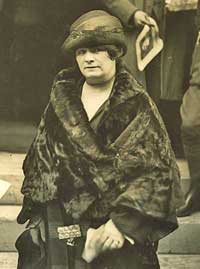Helen Crawfurd 1877-1954
 Helen was raised in a deeply religious environment. However, both parents encouraged political and religious discussion in the home and allowed their children to read widely.
Helen was raised in a deeply religious environment. However, both parents encouraged political and religious discussion in the home and allowed their children to read widely.
However, Helen became increasingly disillusioned with the church during the early years of her married life, especially its teachings regarding the position of women in society, which she believed actively promoted discrimination against women.
Around 1900-01 Helen joined the Women’s Movement, and by 1910 she had joined the WSPU. She was involved in the window smashing episode in London in 1912 - One month's imprisonment in Holloway Prison. This was the beginning of Helen's career as a militant suffragette.
In 1913 she was arrested for attacking police officers who were attempting to arrest Emmeline Pankhurst at a public meeting in St. Andrews Halls in Glasgow. Although released later that night without charge, Helen was promptly re-arrested the following night for smashing the windows of the army recruiting offices in Glasgow, and was sentenced to one month's imprisonment in Duke Street prison in Glasgow.
It was during this term of imprisonment that Helen experienced her first hunger strike, which lasted eight days before she was released under the terms of the 'Cat and Mouse Act'.
On her release she continued to campaign for women's suffrage, becoming one of the most popular platform speakers in the Scottish suffragette movement.
Helen was charged with making inflammatory comments at a meeting in Perth and was sentenced to one month's imprisonment, however she once again went on hunger strike and was released from Perth prison five days into her sentence.
Shortly after her release and return to Glasgow, Helen was blamed for a bomb attack which damaged the Botanic Gardens in Glasgow's West End. She received a prison sentence of two years. Again she went on hunger strike, and was once more released under the 'Cat and Mouse Act'.
Helen resigned from WSPU in1914 and joined Independent Labour Party (ILP). She then began to organise a campaign to oppose Britain's involvement in the war. In 1915 Helen helped set up the Glasgow branch of the Women's International League.
In an attempt to attract more working-class women and to forge a more militant opposition to militarism, Helen, Mary Barbour and others organised a women's peace conference in Glasgow in June 1916. From this initiative the Women's Peace Negotiation Crusade emerged in Glasgow, and a national body of the Women's Peace Crusade (WPC) was launched a year later in 1917, with Helen as honorary secretary.
During 1915, private landlords with properties in munitions districts of Glasgow saw the new demand for housing in these areas as an opportune moment to increase rents. These increases, in a period of already steep rises in the cost of living for many working-class families, were deeply unpopular throughout the munitions districts. They were seen by many as a blatant example of war-time profiteering by unscrupulous landlords, at a time when many of the husbands and sons of those expected to pay the increase in rents were paying the ultimate sacrifice on the battlefields of Europe.
Helen as secretary of the Glasgow Women's Housing Association, helped organise a campaign of non-payment of rents and harassment of landlords' deputies who came calling for rents. It resulted in the passing of the 'Rent Restrictions Act' of 1915, which froze working class rents, not only in Glasgow but throughout Britain, for the duration of the First World War.
In 1921 she left the ILP to join the fledgling Communist Party of Great Britain (CPGB). Throughout the 1920s Helen's energies were devoted in large part to the Workers International Relief Organisation (WIR), an organisation set up to aid economically distressed regions of Soviet Russia. Under Helen it extended its relief efforts during the depression years to Germany, the Scottish Highlands and the west coast of Ireland.
She stood as Communist candidate for the Bothwell division of Lanarkshire in 1929 and North Aberdeen in 1931, failing however to get elected on both occasions.
In the 1930s Helen turned to the fight against fascism.
In 1944 she announced her retirement from public life and went to live with her sister in Dunoon. However in 1946 she was elected the first woman councillor on Dunoon Council, a position she held for two years until ill health forced her to retire.
References:
